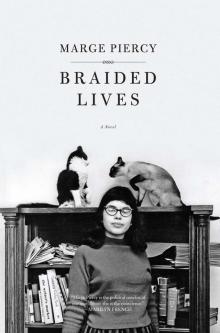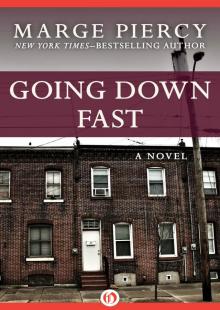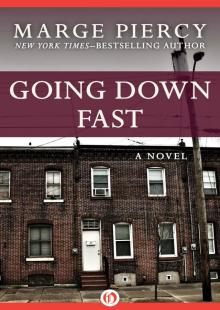- Home
- Marge Piercy
Three Women Page 7
Three Women Read online
Page 7
Beverly sighed. When she looked back over her life and thought about all the good changes she had hoped for, she could get into the dumps. But what the hell. You just had to keep slugging and have fun along the way. Mao was kneading her chest with his paws. She knew he was hungry, and she felt guilty. Finally she hoisted herself up. Felt dizzy again. Now what? High blood pressure? She rarely went to the doctor—just a waste of time and more money for the drug companies. Dr. Moss had given her those ghastly pills that had made her feel like her head was disconnected from her body. She had stopped taking them two months ago. She wasn’t going to poison herself to profit some drug conglomerate. She undressed and put on her nightgown. She sure wasn’t going back out, as wiped as she was.
She dragged herself into the kitchen, ashamed of her fatigue. She opened a can of salmon and split it with Mao, toasting a bagel left over from Marta and Jim’s visit. Marta shouldn’t have let herself go gray. She made more money than Jim. That didn’t shock Beverly the way it would have a lot of women. After all, her own mother, working as a button maker, had made more than their father. Papa got what work he could on the Lower East Side, but Mama had always been the real breadwinner.
Many political women had been able to get work when their husbands were blacklisted or worse, so it was no big deal to her that Marta earned twice what Jim did, but she could tell it was an issue to him. He had not expected to have to go back to school at thirty-six and begin a new career. Eight years later, he was always looking back over his shoulder at the life he should have been leading. She suspected him of getting it off sometimes with his women patients, but she had never said a word to Marta or certainly not to Suzanne, who’d make a federal case of it. She wouldn’t just see that a little of that on the side probably kept him from seriously straying. After all, a guy in a position of authority and sympathy with a woman patient, why wouldn’t they both be tempted? She just observed the signs and kept her mouth shut. Beverly had known Marta as long as she’d been tight friends with Suzanne. As husbands went, Jim wasn’t half bad.
She had wondered how it would go with the three of them sharing that big old rambling house, wondered if Suzanne wouldn’t be tempted by Jim, wondered if she could bottle up her jealousy at living with a couple. But Suzanne had always been controlled, except for that early fling with the Latino guy. Beverly had not liked Sam. His politics were okay, but he was a cold fish, superrational, the kind of guy who would rather argue all night than have a good time. He had married again, a woman who had a trust fund and no ambition but to please him and keep him, and she did. Too bad Victor wouldn’t marry Suzanne. She would have liked him for a son-in-law, but Victor wasn’t the marrying kind. Apparently Suzanne could live in the same house with Jim for years and never give him the eye. Admirable, sure, but a little inhuman. Suzanne had set out to make herself over into a flawless woman, one without weaknesses. A perfect professional who consumed herself in her work. So much of what Suzanne did seemed a silent reproach to herself about the way she lived her life.
Beverly lay on the couch watching her old TV because her eyes were too tired to read. Before she’d gone up to the picket line, she’d knocked herself out, finishing that manuscript she was copyediting. Now she couldn’t see straight. Her vision felt blurry. She turned on a PBS program on cybernetics, but she just couldn’t focus.
When she woke, the TV showed nothing but snow. It must be the middle of the night. She couldn’t see the clock well, which was unusual. When her eyes got tired, she couldn’t read, but she could usually see distant things just fine. She didn’t feel…right. She sat up slowly and her dizziness increased. Her head hurt, sharply. She lurched to her right and almost fell to the floor, realizing she could not put weight on her right arm. Her right hand would not close. She had a feeling of something in her head, something pushing, something pressing. She grabbed the phone clumsily in her left hand, the hand that still worked, put down the receiver and poked at the numbers. She was calling her friend Lucy, who answered after four rings. Once again Beverly clutched the phone in her functional left hand. She was ready to cry with joy when she heard Lucy’s voice. Lucy would come over and help her into bed and maybe call a doctor or persuade her that nothing was really wrong. Maybe she was just dizzy or had a virus. Some middle-ear virus that made her dizzy. But why couldn’t she move her hand? It didn’t feel like pins and needles. It didn’t feel like anything. Why was her hand paralyzed?
“Who the hell is this at four A.M.?”
She meant to say, “Lucy, something’s wrong with me,” but what came out sounded like slow and slurred babble.
“Some stupid drunk!” Lucy snorted, and hung up.
She stumbled across the floor, hanging on to the sofa and then the bookcase and then the door. Her right leg was dragging. Something was terribly, terribly wrong. Was this what dying felt like? Her life was not flashing before her, but her heart was pounding fiercely and her head felt as if it were split open. It was as if some dentist had injected No-vocain into half her body. Her right side was not only numb but uncontrollable, as if she had been cut in two.
She put it together as she finally got the door open. She was having a stroke. Utter panic seized her. She leaned on the doorpost, frozen with terror. Calm, calm, calm, she told herself. You’ve had concussions. In antiwar demonstrations, she had been clubbed. On picket lines, she had been knocked down and kicked. Stroke was just a word. She was still alive. Her mind was functioning. If she could recognize what was wrong with her, it could not be so bad. Several of her acquaintances had suffered strokes. One had never walked again. The other recovered his abilities, but afterward moved more slowly, more hesitantly. But at least he could move. In the hall, her leg gave way under her and she fell. Then she crawled forward until she could knock on Madeline’s door. They were not friends, but they helped each other out. Madeline fed Mao when Beverly went out of town—which seldom happened nowadays. Beverly walked Madeline’s poodle when Madeline had the flu or visited her son. They accepted packages for each other and shared leftover goodies.
She lay on the floor banging on Madeline’s door, but Madeline did not come. However, the Korean woman across the hall looked out. “Mrs. Blume, my God, what happened?” She turned and shouted to her husband in Korean.
Now Madeline finally came to the door, opening it an inch on its chain. “Beverly, what are you doing on the floor? Did you hit her? What’s going on?”
“She’s been mugged in her apartment, I bet. Look, she’s in her nightgown. We have to call the police. It’s like that poor woman on 108th.”
Beverly tried to tell them that she was having a stroke. Madeline bent close to her. “Look at her face. It’s all twisted.”
Mrs. Kim called 911. Mao came creeping out, but Madeline saw him and shut him in her own apartment. Madeline and Mrs. Kim ventured into Beverly’s apartment, Madeline holding her cane and Mrs. Kim brandishing a kitchen knife. “There’s nobody in here. No windows open.”
It was as if she were already dead and a ghost. She could hear them, she could understand them, she could think clearly what she wanted to say, but she could not make her tongue speak the words. She had become far more mute than Mao, who was pretty good at making his needs known. She was a piece of furniture, a sack of flesh lying on the floor. She began to weep quietly with frustration. The tears ran over her face and onto the floor.
The police figured out she was having a stroke and called an ambulance. She was only half conscious, but she was relieved when finally she was carried into the rickety elevator to be taken downstairs. She was terrified, but at last she was off the floor. Doctors dealt with strokes all the time. Lots of people her age had strokes. They would fix her up at the hospital.
8
Suzanne
Suzanne had been in court all day. Her client’s suit against the Dedham Police Department was in its second week, while colleagues were covering her classes. She was planning to wind up today. When the secretary from the law school appeared i
n the courtroom, Suzanne was startled. The woman passed a note to the court officer, who glanced at it and passed it to Suzanne.
Your mother has had a stroke and is in a hospital in New York. This is the phone number. The dr’s name is Weinstein.
She stared at the note. “Are you sure?” she mouthed.
The secretary nodded. Suzanne asked to approach the bench. She showed the judge the note. He frowned. “How old is your mother?”
“She’s seventy…two.”
“Can anyone take over for you?”
“Yes, Your Honor.” She motioned to the defense table, where Marta was sitting. “I’m finishing in perhaps half an hour. Let me do that and then I can try to find out what’s happened.”
“It sounds as if what has happened is perfectly clear.”
“If we could adjourn until Monday, I would be able to fly down and see my mother.”
The judge motioned the police department’s counsel forward. “I don’t have any objection to the delay. Do you, Counsel?”
She called the hospital from her car phone. “Mrs. Blume is in intensive care. Are you a family member?”
“I’m her daughter.”
“I thought her daughter was in today…. No, I see that was her granddaughter. She has had a stroke, but she’s conscious now.”
She packed in fifteen minutes, left instructions with Elena, and ran upstairs. Jim was sitting at his computer. He saw clients three days a week and the rest of the time he worked on his book Shafted and Beyond: A Manual for Those Rendered Superfluous in Middle Age. He had a book contract with a small publisher of self-help books and had been working on the manuscript for two years. She told him the situation and asked him to keep an eye on things downstairs. “But don’t you think Elena will manage?” He swung around in his swivel chair and faced her, leaning back, every bit of his posture indicating a willingness to be interrupted, to talk about her situation.
“Just in case.” She did not take the seat he beckoned her to. Her time was tight.
Jim was a tall, rangy man with an intense smile and the capacity to brood for weeks. His hair was light brown and his eyes such a pale blue they looked silver. She liked him, although she considered him vain, but her real relationship was with Marta. Jim was an appendage. They rarely had a private conversation. They got on, but they did not truly know each other in spite of having lived in the same house for twelve years. It was amazing, Suzanne thought, how much time you could spend with someone and never actually get personal with them. “You and Beverly have a rather fraught relationship, as I recall.”
Recall? He had visited Beverly last week. He was getting into therapist mode. She began to feel a time panic. “Listen, Jim, I really have to get out of here.” She was never comfortable when Jim switched into his therapist role, and right now she could not deal with it.
“I care about Beverly,” he said, leaning forward to indicate a change of focus. “She’s a strong, vibrant woman. Let us know how she is, please. If you need help down there, I could juggle my schedule and drive down.”
She thanked him and tore downstairs. Her supper consisted of a yogurt eaten standing and a tangerine she peeled while waiting for the shuttle. Her stomach was clenched on itself, sore, knotted. All those years of smoking. How many times had she begged Beverly to quit? How many articles had she sent her? Books on the tobacco conspiracy, hoping that politics might succeed where health facts failed. Beverly ate fatty foods, fast foods, processed meats, fruit, yes, but almost no vegetables.
Yet Beverly was such a vital woman, opinionated, energetic, stubborn, independent, and feisty, an elegant woman, still attractive. She caught colds every winter that sometimes went into her lungs, but she had never had a serious illness. Beverly always said, “I’m too busy to get sick.” Suzanne could not imagine what she would find. Was her mother dying? She knew nothing about strokes, imagining lightning striking the brain. A charred smell. Fire and devastation within.
She went straight from La Guardia to the hospital. At first they would not let her see Beverly. She did find out that the stroke had occurred the night before and that a neighbor had called the ambulance. She sat in the small lounge with its air of general tackiness and anxiety soaked into the worn upholstery and the wan carpeting, crowded with other individuals and family groups waiting for word, for a little time with their people in intensive care. It was as if each person or little group was inside a glass box of their own fear, unable to see each other or speak a word across the room.
Rachel walked in. They hugged each other fiercely. Suzanne kept herself from crying by making faces into Rachel’s shoulder. Rachel too was taller than Suzanne, but not as tall as Elena, with a mane of curly light brown hair. Rachel drew away to call her attention to a young man. “Mother, this is Michael.”
Shifting gears abruptly, Suzanne looked him over. A slight, almost wispy man, he had a firm handshake. Probably worked on that. “Do you know each other from school?”
Rachel nodded. “We’ve been seeing each other since late September.”
So why didn’t you mention him? Usually Rachel told her more details of her life than Suzanne could absorb, so why had Rachel held back? Michael seemed to be Jewish, he seemed intact and functional, so what did her silence mean? Suzanne filed away that query for later. “You’ve seen Beverly?”
Rachel nodded. “It’s awful. She can’t talk. Her right side is partly paralyzed.”
Rachel knew exactly what had happened, including the names of the two neighbors who had found and helped Beverly. Finally the nurse told Suzanne that she might go in to see her mother for fifteen minutes. She felt like shouting a protest that she had not come all the way from Boston to see her mother for fifteen minutes.
In the hospital bed, Beverly looked like a broken doll. Her right arm lay on top of the covers as if discarded there. Her face drooped. Her mouth twitched but no words came out. Yet Suzanne could tell that her mother recognized her. Beverly attempted to speak but produced only muddy gurgles. Suzanne felt her chest tearing open with grief and pity. She took Beverly’s limp right hand. The left hand moved over to stroke her arm. Suzanne fought back tears, bit down on her cheeks to keep from losing control. She was terrified for Beverly, who looked half dead. Were the doctors doing enough? She was just lying there with tubes in her. She must ask them if there wasn’t some sort of operation, something that could be done.
Her mother was definitely there, conscious. She could feel the intellect behind her mother’s green eyes. “Mother,” Suzanne said. “If I could only find out if there’s anything you need me to do for you.”
Her mother was stroking her arm. No, not stroking. Suzanne looked at the finger. M. Beverly was sketching an M. Suzanne scrabbled in her bag for a pen and a bit of paper and put them in her mother’s still functioning left hand. However, Beverly was right-handed. Still Beverly dug at the piece of paper with the pen. M again.
“M, Mother? What’s M?”
A jagged A. A crooked O. “Mao. Your cat. You want me to find out what’s happened to your cat?”
Beverly nodded.
“Ah, you can move your head yes and no. That’s great.” She felt an enormous flood of relief. At least there was some communication possible. “You can understand what I say?”
There was familiar irritation in that vehement nod.
“When they kick me out, I’ll go to your apartment. How will I get in? Will the super let me in?”
Beverly traced a P on her arm.
“P? Postman? Pills?”
Beverly groaned. She traced a U, then an R.
“Purse? Your purse?” Suzanne felt absurd. They were playing twenty questions, a children’s game she had played with Aunt Karla many times. She could see from Beverly’s furious expression on the side of her face still expressive that her mother was aware of the absurdity and hated it. Beverly had always been a formidable presence to Suzanne, judgmental, opinionated, and always in her own way, elegant. A small woman like Suzanne, but not
a woman who felt small in her manner, her impact, her bearing. Suzanne had always felt she was a disappointment to her mother, who combined militancy with style. Even at seventy-two, Beverly remained a flirt, a charmer. Nobody in their right mind would ever call Suzanne flirtatious or charming. She was capable. She was organized. Her intellect was far more honed than her mother’s. She was successful. But in her mother’s presence, she felt awkward, lumpy, unadorned. Plain but serviceable. The woman in the bed was a parody of her mother, but Beverly was present, trapped behind that ghastly grimace, that twisted face and limp body. Suzanne felt guilty she had not returned her mother’s call. When Elena had told her that Beverly needed a check for some tenants’ strike, Suzanne had been miffed. She had plenty of expenses and causes without needing her mother to put the bite on her. She should have called back anyhow.
She searched the room and the purse turned up. Indeed, the keys to Beverly’s apartment were inside. “I’ll stay in your apartment tonight.”
Beverly nodded.
“Is there anything else you need?”
Beverly threw up her left hand in a helpless gesture. A tear rolled down her cheek from her left eye. The nurse appeared. “Now, time for our little patient to get some rest.”
Suzanne could not endure hearing Beverly referred to in such a condescending way. “Please. My mother is a very able, highly intelligent woman. I want her to have the best care. I want her to have intensive rehabilitation.”
“I’m sure Dr. Weinstein is doing everything that can be done.” The nurse ushered her firmly out.
She had supper in the hospital cafeteria with Rachel and Michael, who were returning to Philadelphia that night. “But I’ll come back. It’s easy. We can even study on the train.” Rachel fussed over Michael as he ate. She did everything but cut his meat for him, and she probably would have done that if he had eaten any. They both seemed to subsist on salads and juice. Of course, the food here wasn’t kosher. Michael seemed to take being fussed over for granted. He liked it, obviously. She would never approve of the way her daughters behaved with men. Rachel had been involved with a few boyfriends previously, but this seemed different. She could not remember Rachel acting so possessive. In some ways they behaved more like an old married couple than like people who were just falling in love. She wondered sharply if they were living together, for they had a strikingly domestic air. Maybe that’s why she’d had so much trouble getting Rachel on the phone in the last few months.

 Woman on the Edge of Time
Woman on the Edge of Time The Cost of Lunch, Etc.: Short Stories
The Cost of Lunch, Etc.: Short Stories Made in Detroit: Poems
Made in Detroit: Poems Sleeping With Cats
Sleeping With Cats Moon Is Always Female
Moon Is Always Female The Longings of Women
The Longings of Women Circles on the Water
Circles on the Water Summer People
Summer People Gone to Soldiers: A Novel
Gone to Soldiers: A Novel The Hunger Moon: New and Selected Poems, 1980-2010
The Hunger Moon: New and Selected Poems, 1980-2010 Vida
Vida Fly Away Home
Fly Away Home He, She and It
He, She and It So You Want to Write
So You Want to Write Small Changes
Small Changes Braided Lives
Braided Lives Lord Valentine's Castle
Lord Valentine's Castle Dance the Eagle to Sleep
Dance the Eagle to Sleep City of Darkness, City of Light
City of Darkness, City of Light The High Cost of Living: A Novel
The High Cost of Living: A Novel Going Down Fast: A Novel
Going Down Fast: A Novel My Mother's Body
My Mother's Body Storm Tide
Storm Tide Going Down Fast
Going Down Fast The Third Child
The Third Child The Hunger Moon
The Hunger Moon The Cost of Lunch, Etc.
The Cost of Lunch, Etc. Sex Wars
Sex Wars The High Cost of Living
The High Cost of Living Made in Detroit
Made in Detroit Gone to Soldiers
Gone to Soldiers